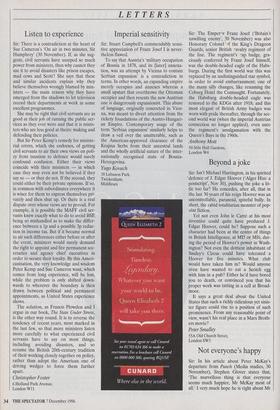Beyond a joke
Sir: Isn't Michael Harrington, in his spirited `defence of J. Edgar Hoover (Alger Hiss: a postscript', Nov 30), pushing the joke a lit- tle too far? He concedes, after all, that in the last 30 years of his reign Hoover was an uncontrollable, paranoid, spiteful bully. In short, the rabid totalitarian monster of pop- ular fiction.
Yet not even John le Carre at his most inventive could quite have produced T. Edgar Hoover, could he? Suppose such a character had been at the centre of things in British Intelligence, at MI5 or MI6, dur- ing the period of Hoover's power in Wash- ington? Not even the dottiest inhabitant of Smiley's Circus could have tolerated a Hoover for five minutes. What club would have taken him in? Would anyone even have wanted to eat a Scotch egg with him in a pub? Either he'd have bored you to death, or convinced you that his proper work was tatting in a cell at Broad- moor.
It says a great deal about the United States that such a richly ridiculous yet sinis- ter figure could rise to a position of such prominence. From any reasonable point of view, wasn't his real place in a Marx Broth- ers movie?
Peter Smalley
55A Old Church Street, London SW3


















































































 Previous page
Previous page